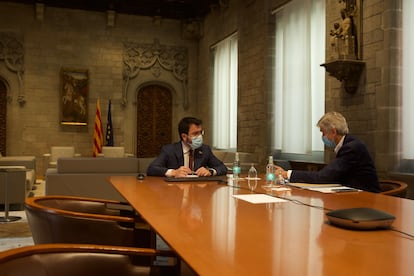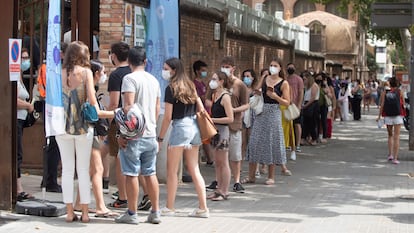As pandemic surges, courts authorize night curfew for 161 towns in Catalonia
Other regions of Spain have met with mixed success as they seek to reintroduce mobility restrictions to curb the swift spread of the coronavirus

As the fifth wave of the coronavirus pandemic continues to gather pace in Spain, more regions are requesting court authorization to reimpose curfews and other restrictions on mobility – and meeting with mixed results.
In Catalonia, which has the highest case rate in Spain – 1,100 per 100,000 residents in the last 14 days – the regional High Court on Friday greenlighted a 1am-6am curfew requested by the Catalan government for 161 municipalities with the highest transmission risk. The measure will remain in effect for a week, until July 23, when regional authorities are due to update the list of affected locations. In its decision, the court specified that the measure should be viewed as a “restriction” rather than a suspension of fundamental rights.
Earlier this week, Spain’s Constitutional Court ruled against the state of alarm that the central government used to impose a strict home confinement last year. The controversial decision, issued by a highly divided panel of judges, has triggered a renewed debate over the legal limits of what central and regional governments can do to curb virus transmission. A series of both favorable and adverse decisions issued by several regional courts on Friday is further underscoring how divided society – and judges – are on the issue.

“The night-time confinement has received [court] backing. It is a difficult but necessary measure to curb contagion, protect lives and the health system,” said the Catalan premier, Pere Aragonès, in a message on social media on Friday. “It will go into effect tonight. Together, we will flatten the Covid curve.”
The Catalan executive wants to introduce curfews in municipalities with populations of 5,000 or more and a seven-day incidence of over 400 cases per 100,000. The measure could affect over 80% of all residents of Catalonia, or around six million people. The Catalan health department chief, Josep Maria Argimon, on Friday admitted that things have been done poorly ever since cases began surging once more in late June, when most existing restrictions were lifted ahead of the summer.
After initially closing nightlife venues, the Catalan goverment had announced upcoming measures to curb an “explosive” growth of cases fueled by the more contagious delta variant, which is mostly infecting young, unvaccinated people. In Catalonia, the number of hospitalized Covid-19 patients has doubled in a week, although so far there are few concerns that hospitals will be stretched as they were during earlier waves, when most of the population was yet to be vaccinated.
Navarre
The northern region of Navarre also wants to impose a 1am-6am curfew in municipalities with a 14-day incidence of over 250 cases per 100,000, beginning on July 21. The regional health chief, Santos Induráin, on Friday said that the measure would be justified by a recent surge in infections and hospitalizations, and that the request will be made on Monday before the regional High Court. The curfew would affect 80% of the population.
The government of Navarre, where the 14-day incidence is now more than 779 cases per 100,000, far above the national average of 500.75, will also cap outdoor gatherings at 10 people and suspend rules allowing crowded outdoor summer events such as parades.
Induráin said the government is trying to implement highly targeted measures “that will have the smallest possible impact on our social, economic and emotional lives.”
Other regions
In Cantabria, the regional High Court on Friday authorized a 1am-6am curfew in 56 municipalities with high infection rates. The restriction will go into effect as soon as the decision is published in the regional official gazette.
In the Valencia region, the executive has secured court backing to restrict social gatherings to a maximum of 10 people and to introduce curfews in places with high infection levels.
But judges have ruled against restrictions in Extremadura, which had been seeking authorization for curfews in three municipalities, and also in the Canary Islands, where they rejected the measure for the island of Tenerife.
The Basque Country is not seeking to impose curfews per se, but has banned social gatherings of people from different households and prohibited crowds between midnight and 6am in order to avoid street parties and binge drinking.
English version by Susana Urra.
Tu suscripción se está usando en otro dispositivo
¿Quieres añadir otro usuario a tu suscripción?
Si continúas leyendo en este dispositivo, no se podrá leer en el otro.
FlechaTu suscripción se está usando en otro dispositivo y solo puedes acceder a EL PAÍS desde un dispositivo a la vez.
Si quieres compartir tu cuenta, cambia tu suscripción a la modalidad Premium, así podrás añadir otro usuario. Cada uno accederá con su propia cuenta de email, lo que os permitirá personalizar vuestra experiencia en EL PAÍS.
¿Tienes una suscripción de empresa? Accede aquí para contratar más cuentas.
En el caso de no saber quién está usando tu cuenta, te recomendamos cambiar tu contraseña aquí.
Si decides continuar compartiendo tu cuenta, este mensaje se mostrará en tu dispositivo y en el de la otra persona que está usando tu cuenta de forma indefinida, afectando a tu experiencia de lectura. Puedes consultar aquí los términos y condiciones de la suscripción digital.









































